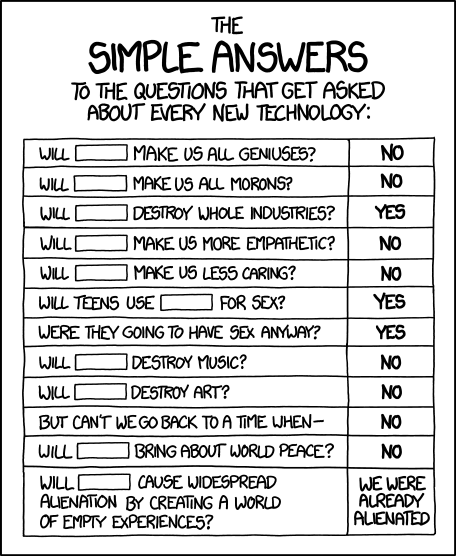What
I have always loved about embracing a new field of study is the moment when realizations
start to multiply. It’s always a little bit magical; always a little bit like
your brain has suddenly become more clever than it really is. Reading Lev
Manovich’s Software Takes Command
this week brought me some of these clarifying moments; hopefully I’ll be able
to recreate some of the connections outside the insulation of my internal
dialogue.
The
place where Manovich starts his book—basically, with the omnipresence of
software—is sound. Software is certainly an integral part of my day-in, day-out
experience—I’m writing this blog post on Word, which I will then copy and paste…I
could spend the whole post just proving his point that we are now in a “software
society.” I’ve been teaching my students recently about how to introduce main
ideas into writing, so I feel a bit guilty just jumping in, but—and this is so
often the case—the interesting part starts when we take the given statement as
truth and move forward. So, in that vein…
Just as adding a
new dimension adds a new coordinate to every point in space, “adding” software
to culture change the identity of everything that a culture is made from. (In
this respect, software is a perfect example of what McLuhan meant when he
wrote, the “message of any medium or technology is the change of scale or pace
or pattern that it introduces into human affairs.”) (33)
I
couldn’t help but think about this XKCD comic when I read Manovich’s
introduction:
 |
| http://xkcd.com/1289/ |
It does seem to accurately represent the questions
that we so often ask when “New Thing X or “Exciting Gadget Y” comes to the
table; my favorite recent example is the conversation swirling around Google Glass. To hear people talk, it's either the making or the breaking of the world as we know it.
And, of course, it wouldn’t be a conversation
about technology, or a conversation about a conversation about technology, if
we didn’t get to talk about alienation. This time, though, it’s different,
because standing against the traditional “technology is a wedge that sits
between the individual and others” argument is Manovich’s idea of
hybridization. I’ll let him define it:
…in media
hybrids, interfaces, techniques, and ultimately the most fundamental
assumptions of different media forms and traditions, are brought together
resulting in new media gestalts. That
is, they merge together to offer a coherent new experience different from
experiencing all the elements separately. (167)
So,
rather than a divisiveness, we have cohesion and creation. What I love about
this concept is that in it I also see reflected the academic values that
resonate most with me. The difference between text and video existing
side-by-side and text acting in the way
that a video acts is the difference between static and dynamic education. Up
until recently, I’ve led a very English Studies-centric life. But, no, that’s
not quite true, either. Let me try again. Up until recently I’ve led a very
Creative Writing-in-English Studies-centric life. And I couldn't be doing what I'm doing now without that history, and I do value the type of learning that a single-lens focus allows for. However...
As
always, for me, it comes down to language. As Manovich continues to explain
hybridization, he says:
…in the process
of hybridization…we end up with a new metalanguage
that combines the techniques of all previously distinct languages… (170)
This
is exciting for all kinds of reasons. The one that’s sitting in the front of my
mind at present, though, is this: in an environment where new (media) experiences,
to borrow Manovich’s phrase, are increasingly prevalent, I have to imagine that
those experiences are going to come with a multiplicity of mores—more combinations,
more conversations about those combinations and hybrids, more people
contributing to the conversations. As a relatively young person looking into the complicated maze of academia, I can tell you that this matters--really matters. If it represents a shift in thinking, an increased openness and interest in collaboration, then let me own my idealism and tell you that all of this is very good news.
Being a relatively young academic is a strength for you. Academia has always been slow to adopt new ideas within it's doors. This new "revolution" is a different thing all together. Academia, well most, seems to be welcoming this new technology with open arms. You will be able to build on that with your expertise. Yes, you are correct in that this is a nice shift in the building of collaboration. It is a brave new world.
ReplyDelete